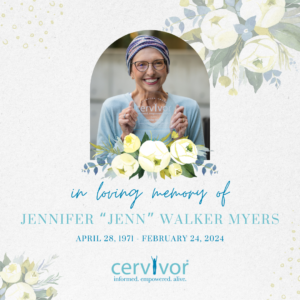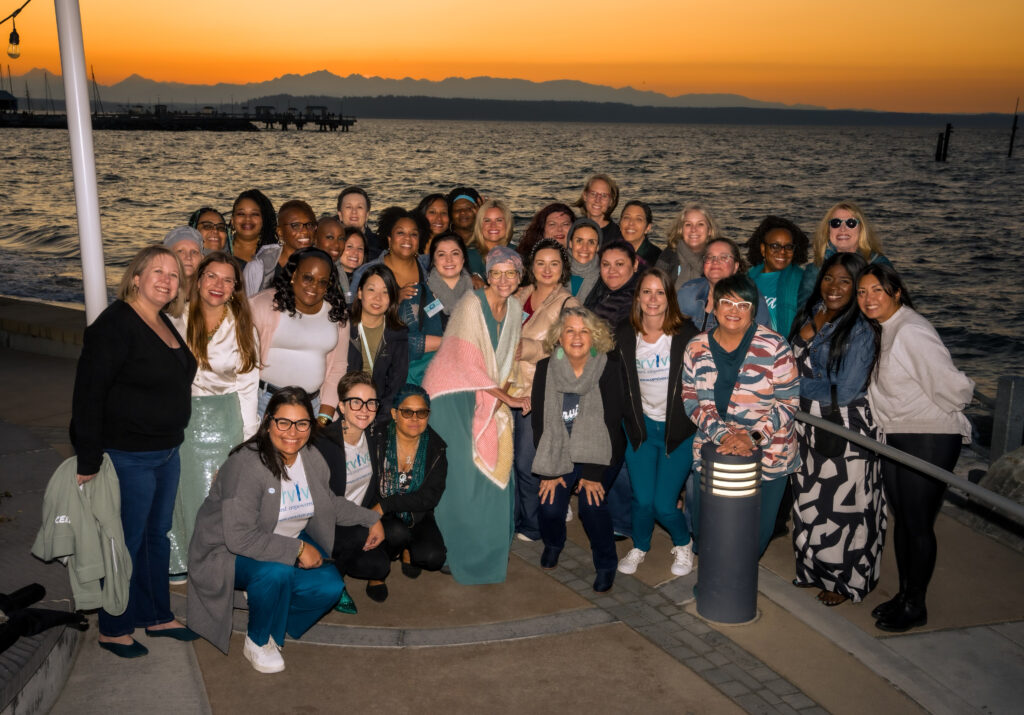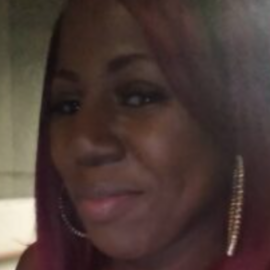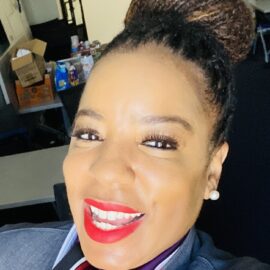
In the quiet corners of Pennsylvania, a fierce individual fought valiantly against cervical cancer. Today, we come together to remember and celebrate the extraordinary life of Jennifer “Jenn” Walker Myers, a woman whose strength, resilience, and generous spirit touched the lives of many.
Jenn’s journey with cervical cancer brought her to the doors of Cervivor, a community that became her refuge and her sanctuary. In her own words, “When I discovered Cervivor two and a half years ago, I felt like a weight that I didn’t even know existed was lifted from my mind.”
This group of women from diverse backgrounds understood the depth of her struggles, offering solace and understanding that transcended the boundaries of a traditional support network. Cancer became Jenn’s unexpected occupation, leading her to leave behind a career she loved. Yet, rather than succumbing to despair, she channeled her 30 years of leadership, mentoring, communication, and support experience to uplift others within the Cervivor community. For Jenn, this became a new mission – a calling that resonated with her heart and soul. “Cancer is my new job, and Cervivor is the platform in which I can help others,” she proclaimed.
Jenn’s dedication extended beyond the digital realm of Cervivor. Despite her ongoing treatments and the physical toll they took, she actively participated in initiatives like the Cervical Cancer Awareness Month planning committee, demonstrating her commitment to raising awareness about cervical cancer. Her advocacy work was not confined to boardrooms or meeting halls; even from her hotel room in the midst of recovery, she continued to lend her voice to the cause.
One of the remarkable qualities that defined Jenn was her passion for helping others navigate the complex landscape of clinical trials. In her role as a patient advocate, she enlightened others on the intricacies of these trials and offered a sign of hope, showing that there were still options for those in the throes of this relentless and unforgiving disease.
While facing multiple recurrences of cervical cancer, Jenn refused to let it impede her mission. She remained an active participant in Cervivor, utilizing various platforms – news interviews, panels, and patient advocate roles – to share her story and bring about change. She served on the National Cancer Institute’s Cervical Cancer Task Force, was an American Association for Cancer Research member and was featured in their 2022 annual report to Congress. Her voice echoed through fundraising efforts, turning her own birthday into a donation drive to support Cervivor’s Comfort Care and Compassion Program as well as gathering her family to do multiple unique fundraisers in her honor — a true testament to her compassion and commitment to the cause.
Even as Jenn continued her journey through cervical cancer, she never stopped spreading awareness about the importance of HPV vaccination and the realities of living with this disease. She shared her story with candor, honesty, and a desire that anyone facing cervical cancer would find the same support and camaraderie she discovered within Cervivor. Jenn was acknowledged with the 2022 Cervivor Champion Recipient, the 2022 Erica Frazier Stum Living with Cancer Recipient and was a 2023 Cervivor School Graduate.

In early 2024, Jenn along with her family established The Nennie Foundation. Jenn was lovingly known as ‘Nennie’ to her nieces and nephews. The nonprofit was developed to help cancer patients by assisting them financially with their cancer journey. Jenn was blessed to be able to navigate her journey financially unlike many others in the same situation. The Nennie Foundation will provide grants to cancer patients who face financial challenges in accessing healthcare. These “small acts of kindness” represent how Jenn liked to shower her family and friends with small gifts as thank yous, get well or milestone celebrations. It was Jenn’s wish that no flowers be sent but instead to consider donations to the Nennie Foundation to help as many cancer patients as possible in her honor.
Jennifer Walker Myers may have left this world, but her legacy lives on. She leaves behind a trail of inspiration, advocacy, and hope that will continue to guide and uplift those who follow in her footsteps. Today, we honor a true Cervivor, a symbol of strength and resilience, and a woman whose impact on the fight against cervical cancer will forever be etched in our hearts.


